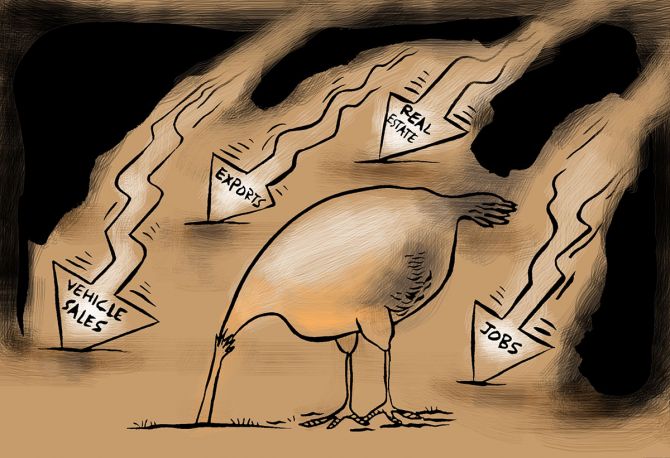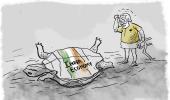The problem is major, and the problem affects hundreds of millions of people.
Ignoring it must have a sound reason.
Ignoring it must in some way be more important than addressing it, notes Aakar Patel.

If I do not acknowledge that I have a problem I cannot solve it.
If the problem is minor this is less consequential and does not affect me beyond a point. It is only an irritant that I can continue to ignore.
If the problem is major, if the problem affects not just me but people around me, then ignoring it must have a sound reason. Ignoring it must in some way be more important than addressing it.
The sale of cars in India has not grown for the last five years.
The number of cars bought by Indians in 2015-2016 was 27 lakh units (2.7 million).
The number of cars bought in 2019-2020 was 27 lakh units. India's middle class is either not growing or not spending.
The government says stagnating car sales is not a problem because the young prefer to use Uber and Ola.
The United States sold 2 crore (20 million) cars last year. Uber and Ola does not seem to affect any other nation.
The sale of two wheelers in India has not grown for the last four years.
1.7 crore (17 million) units were sold in 2016-2017 and 1.7 crore units were sold in 2019-2020.
This is the vehicle of the lower middle class, the size and consumption of which has not grown for four years.
What theory the government has for this we do not know because it has not been acknowledged that there is no growth.
Commercial vehicles have not shown any growth for the last four years.
Sales were 7 lakh (700,000) units in 2016-2017 and 7 lakh units in 2019-20.
This are the vehicles like trucks that carry products either to manufacturers or to the market.
The real meaning of four years of zero growth in this market can be imagined.
Real estate has shown no growth over the last four years.
Indians bought Rs 2 lakh crore worth of real estate in 2016.
They bought Rs 2 lakh crore worth of real estate in 2019.
India's exports have not grown for six years.
The country exports the same quantity that it did when Manmohan Singh was prime minister.
India was exporting about $300 billion a year when the UPA left.
It exported about $300 billion in 2019-2020. Why is this the case? We do not know because the government does not speak about it.
When imports fell into India fell more than exports out of India, the government celebrated the moment as an achievement.
Employment has not only not grown in the last six years, it has actually gone down.
A report produced by the government showed it to be at over 6% in 2018, more than at any other time in history.
Why are Indians losing employment? We do not know.
The government has dismissed the issue and said that pakora sellers and Uber drivers were replacing traditional employees.
It is true that Covid has affected India's economy deeply and will continue to do so.
We are unlikely to get back to the GDP figure we achieved in January this year for another three years.
Meaning that by the time Modi's second term ends, we will still only be economically where we were in January this year.
The problem is that where we were in January this year was not a good space.
All the numbers that have been referred to above are before Covid.
The stagnation in our economy has happened before the lockdown and have nothing to do with our current crisis.
If and when we are able to overcome the Covid related problem with our economy we will go back only to the earlier problem.
India's GDP growth declined every quarter for 10 quarters before Covid.
Why? We do not know.
It could be one reason, it could be many reasons.
But if we do not acknowledge the issue we will never solve it.
You can only think about, discuss and then implement corrective measures if you acknowledge that corrective measures are needed.
If you are carry on like nothing happened, then deep problems do not fix themselves and do not go away.
The government went from saying that India was the one bright spot in the world's economy and the fastest growing economy in the world to not saying anything about the economy at all.
The problem is major, and the problem affects not just the prime minister but hundreds of millions of people.
Ignoring it must have a sound reason. Ignoring it must in some way be more important than addressing it.
Aakar Patel is a columnist and writer.
You can read Aakar's columns here.
Feature Presentation: Aslam Hunani/Rediff.com











 © 2025
© 2025